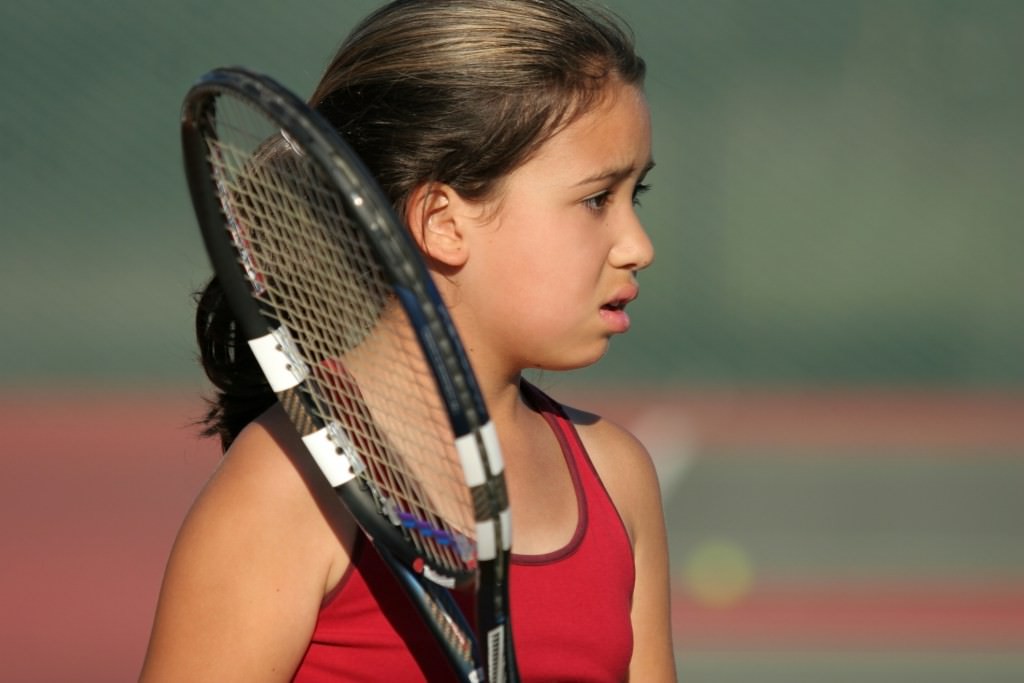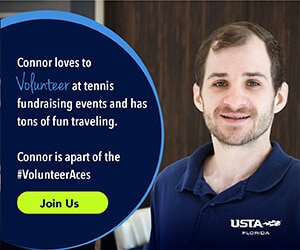March 16th, 2016
Game Changer: Why I Quit Tennis…Parents Pay Attention
The USTA Florida Game Changer series examines some of the leading tennis industry products, tips, tennis insights and other issues changing the game. Share your insights in the comment section below, and using the hashtag #GameChanger.
This month’s guest blogger is Shelly the “Tennis Chicky,” a former high school and junior competitive player.
This is the true story of an above-average high school athlete, her super involved-competitive dad and the consequences in high school sports.
Here’s an article about the odds of your kid becoming a college athlete in various sports and here’s some data on the chances of turning pro to get you in the proper mindset.
I remember taking my first tennis lesson at 15 years of age, ancient to most of the other kids beginning tennis. The only real tennis practice I had been exposed to was hitting a few times with my dad and banging tennis balls against our brick house. I was excited to get some actual tennis lessons and learn more about the game. After the first few feeds the coach started laughing to himself and I was curious what was so humorous. He fed me a few more balls, deemed me a “natural” and immediately called the high school tennis coach to come and watch my lesson. To my surprise, they said I would play #1 on the team, although I had never played a true match and wasn’t even sure of how to keep score.
After that first lesson, I started hitting baskets of balls almost every other day with my dad. I loved tennis so this was enjoyable even though it was borderline obsessive. My dad is a super-competitive man who really enjoyed tennis so I loved spending time on the courts with him. He would feed me balls for usually an hour or so every other night and would coach me until he felt I had improved.
Tennis had been recreational and carefree until I began competing on my high school team; now expectations were high. I lost my first high school tennis match at #1 singles but was assured by our coach that my competitor was the best I would see until sectionals. I put a lot of pressure on myself to win and my dad upped the ante by adding even more. Dad was at every match, pacing outside the fence when I wasn’t playing well or leaned into the fence when I was beating my opponent. Many times he was silent during my match but his body language told me everything I needed to know. He wanted me to show him more of the “killer instinct” that he possessed or he wanted me to play tougher.
I started winning most of my high school matches and took competing a step further by playing junior USTA tennis. Tennis became infinitely more complicated and stressful because time, travel and entry fees were all part of the equation. I remember going to my first USTA-sanctioned match and being bombarded by pretty, lean, athletic girls who had most likely grown up on a tennis court. Lots of these girls had taken lessons for a decade and possessed lots of “match play” experience. I soon learned that along with tennis experience, they owned the mental aspect of competition.
When I refer to the mental aspect of competition, I mean mental toughness and head games. I was naive to this psyche my new opponents possessed and found myself being manipulated and even cheated a few times. I remember being cheated (as told by my Dad later) by a feisty tennis girl, and my dad being furious for allowing her to take the match from me. After losing the match we immediately headed to the car with no words spoken. The silence on that 70-mile car ride home was deafening and I was exhausted from the grueling match itself. I didn’t really understand why Dad wasn’t talking to me and I was upset that I had just lost such a tough match. From then on his presence at the tennis courts was so much scarier than any opponent I could ever face.
Everything was really happy and positive from my Dad as long as I was winning, but the losses showed another face. After losing another draining marathon-like match, he held up a tennis ball and asked if I had ever seen one before. Keep in mind I was practicing day after day and was tormented by my loss as well, but his behavior demoralized me.
I managed to earn a decent ranking of 11th in the state by age 18, but my anxiety caused me to quit tennis even though college tennis was an option. I just couldn’t deal with more pressure to compete at any level and was completely burned out on the sport. The thought of playing tennis at an even higher level of competition gave me instant anxiety and stress.
I know this sounds like an attack on my dad but this is just one aspect of him; he’s an awesome man and father whom I love dearly. Having me, his daughter (an extension of himself) competing was just too much for him to handle. He wanted me to achieve more, play better and always be a winner because of his strong love for me. He understands now that he was wrong for putting so much pressure on me and has apologized for his behavior. All has been forgiven and I realize my life would be very different had I not been pushed to play a higher level of tennis. When I returned from my five-year tennis hiatus, I had the opportunity of meeting lots of new people including my best friend Misty and my husband John.
The purpose of my story is to help parents realize that their support is needed and wanted as their kids compete in any sport, but be mindful of how you are reacting. When referring to support, I mean offering some critiquing of their kid’s performance but maintaining a neutral emotion. Kids don’t need to feel as though they have to earn their parents love by winning, they need to feel the love and support regardless of the outcome. You want your children to develop a love of sports and competition as an outlet for stress and pressures they have in their everyday life. Let the pressure they feel come from themselves and not you, so they can enjoy it, free from anxiety and fear.
As for me, I started playing again years later but still have a fear of loved ones watching me “perform” in any tennis match.
Shelly the “Tennis Chicky” blogs about tennis at www.tennischicky.com.



